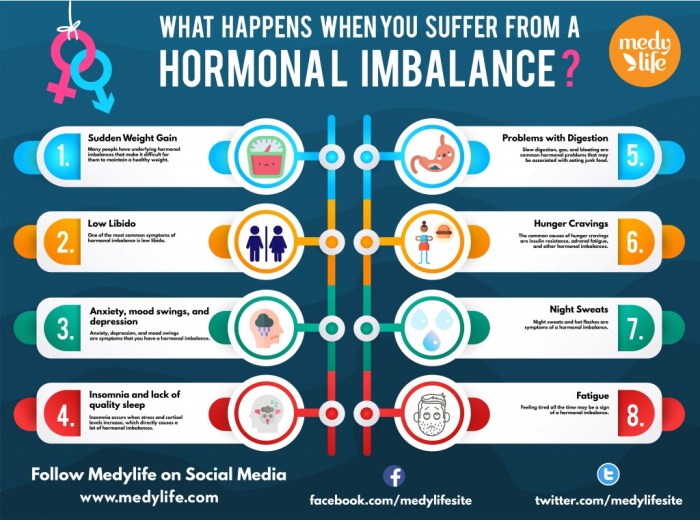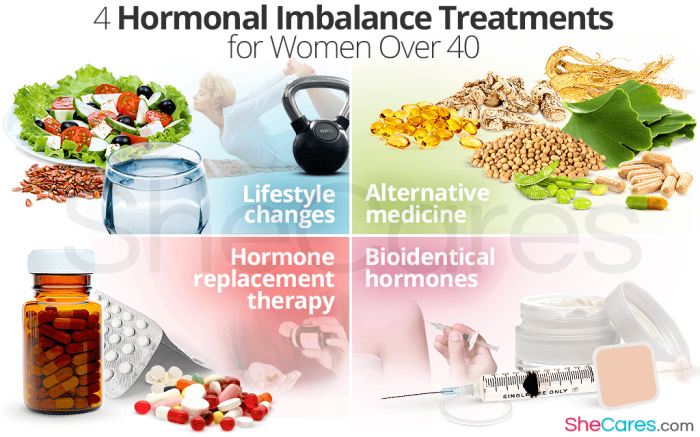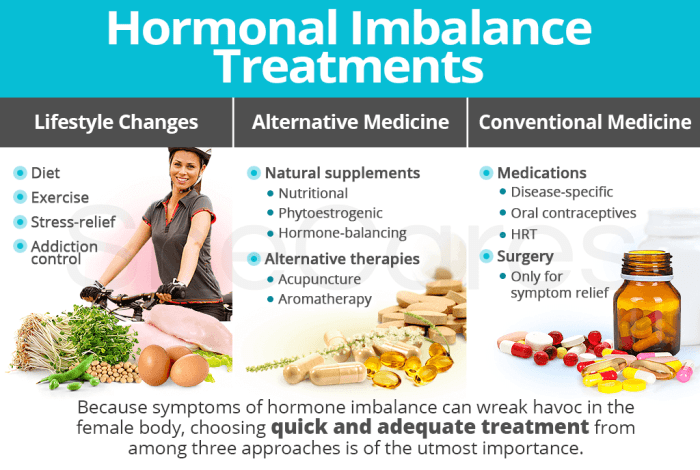Weight loss after 40 for women with hormonal imbalances embarks on an enlightening journey, unraveling the complexities of hormonal shifts and their impact on weight management. As women transition through this stage of life, hormonal fluctuations can significantly influence metabolism and weight gain, making it essential to understand these changes and develop tailored strategies for successful weight loss.
This comprehensive guide delves into the intricate interplay between hormones, metabolism, and weight, empowering women with knowledge and actionable steps to overcome hormonal challenges and achieve their weight loss goals.
Hormonal Changes and Weight Gain
As women enter their 40s, their bodies undergo significant hormonal changes that can impact their weight. These changes include:
1. Decreased Estrogen and Progesterone: Estrogen and progesterone are hormones that help regulate metabolism and appetite. As these hormones decline, metabolism slows down, and appetite increases, leading to weight gain.
2. Increased Cortisol: Cortisol is a stress hormone that can also contribute to weight gain. When cortisol levels are high, the body releases glucose into the bloodstream, which can lead to increased insulin production and fat storage.
Impact on Metabolism
The hormonal changes experienced by women over 40 can significantly impact their metabolism. As estrogen and progesterone levels decline, the body’s ability to burn calories decreases. This means that women may need to consume fewer calories to maintain a healthy weight.
Impact on Appetite
Hormonal changes can also affect appetite. As estrogen and progesterone levels decline, appetite may increase. This is because these hormones help to regulate hunger and satiety. As their levels decrease, women may feel hungrier more often and have difficulty feeling full.
Estrogen and Weight Loss
Estrogen is a hormone that plays a crucial role in regulating metabolism and body weight. During a woman’s reproductive years, estrogen helps maintain a healthy weight by promoting the breakdown of fat and inhibiting its storage. However, as women approach menopause, estrogen levels naturally decline, leading to a shift in body composition and an increased tendency to gain weight.
Estrogen’s Role in Weight Regulation
Estrogen exerts its effects on weight regulation through several mechanisms:
- Appetite control:Estrogen suppresses appetite by regulating the production of hormones involved in hunger and fullness.
- Fat metabolism:Estrogen promotes the breakdown of fat by increasing the activity of enzymes involved in lipolysis.
- Glucose metabolism:Estrogen improves insulin sensitivity, which helps regulate blood sugar levels and prevent the storage of excess glucose as fat.
Thyroid Function and Weight
Thyroid hormones play a crucial role in weight management. They regulate metabolism, the process by which the body converts food into energy. When thyroid function is optimal, metabolism functions efficiently, promoting weight loss or maintenance.
Thyroid Disorders and Weight Loss
Thyroid disorders, such as hypothyroidism (underactive thyroid) and hyperthyroidism (overactive thyroid), can significantly impact weight loss efforts.
- Hypothyroidism:In hypothyroidism, the thyroid gland does not produce enough hormones, leading to a slowed metabolism. This can make it challenging to lose weight, even with a healthy diet and exercise routine.
- Hyperthyroidism:Conversely, in hyperthyroidism, the thyroid gland produces too many hormones, resulting in an accelerated metabolism. While this may seem beneficial for weight loss, it can also lead to other health concerns and is not a sustainable or healthy way to lose weight.
Stress and Weight Gain
Stress is a common trigger for weight gain, especially among women over 40. When we’re stressed, our bodies release the hormone cortisol, which can lead to increased appetite and cravings for sugary and fatty foods. Cortisol also slows down our metabolism, making it harder to burn calories.
In addition, stress can lead to hormonal imbalances that can further contribute to weight gain. For example, stress can increase the production of estrogen, which can lead to water retention and bloating. Stress can also decrease the production of progesterone, which can lead to increased appetite and cravings.
Managing Stress
If you’re struggling with stress, there are a number of things you can do to manage it and reduce its impact on your weight. Some helpful tips include:
- Exercise regularly. Exercise is a great way to reduce stress and improve your overall health.
- Get enough sleep. When you’re sleep-deprived, you’re more likely to experience stress and cravings.
- Eat a healthy diet. Eating a healthy diet can help you to feel better and reduce your stress levels.
- Practice relaxation techniques. There are a number of relaxation techniques that can help you to reduce stress, such as yoga, meditation, and deep breathing.
- Talk to a therapist. If you’re struggling to manage stress on your own, talking to a therapist can be helpful.
Diet and Weight Loss
After 40, women often experience hormonal imbalances that can make it difficult to lose weight. However, following a healthy diet can help support weight loss and improve overall health.
Some specific foods and nutrients that are beneficial for women with hormonal imbalances include:
Fiber
Fiber helps to keep you feeling full and satisfied, which can help reduce calorie intake. Good sources of fiber include fruits, vegetables, and whole grains.
Protein
Protein is essential for building and maintaining muscle mass. Muscle mass helps to burn calories and boost metabolism.
Healthy Fats
Healthy fats, such as those found in avocados, nuts, and olive oil, can help to balance hormones and reduce inflammation.
Calcium
Calcium is important for bone health and can also help to reduce the risk of weight gain.
Vitamin D
Vitamin D is essential for overall health and can also help to boost metabolism.
Exercise and Weight Loss: Weight Loss After 40 For Women With Hormonal Imbalances
Regular exercise is crucial for weight loss after 40, especially for women with hormonal imbalances. Exercise helps burn calories, build muscle, and improve insulin sensitivity, all of which contribute to weight loss.
Weight loss after 40 for women with hormonal imbalances can be a real struggle. But don’t give up! There are things you can do to get your hormones back in balance and start losing weight. One important thing is to get regular exercise.
Exercise can help to improve insulin sensitivity, reduce inflammation, and boost metabolism. If you’re not sure where to start, check out this exercise plan for weight loss after 40 . It’s designed specifically for women over 40 who are struggling with weight loss.
With a little effort, you can get your hormones back in balance and start losing weight for good!
When choosing exercises, it’s important to consider the following:
- Intensity:Aim for moderate-intensity exercises that you can sustain for at least 30 minutes most days of the week.
- Type:Choose a variety of exercises that include both cardio and strength training.
- Safety:Consult with a healthcare professional before starting any new exercise program, especially if you have any underlying health conditions.
Recommended Exercises
- Cardio:Brisk walking, jogging, swimming, cycling
- Strength training:Bodyweight exercises (e.g., squats, lunges), resistance band exercises, weightlifting
- Yoga:This mind-body practice can help improve flexibility, balance, and stress levels.
Sleep and Weight Loss
Sleep plays a crucial role in weight management. When we don’t get enough sleep, our bodies produce more of the stress hormone cortisol, which can lead to increased appetite and cravings for unhealthy foods. Sleep deprivation can also disrupt our hormones that regulate hunger and fullness, making it harder to control our food intake.
, Weight loss after 40 for women with hormonal imbalances
Studies have shown that people who get less than 7 hours of sleep per night are more likely to be overweight or obese than those who get 7-9 hours of sleep. In addition, sleep deprivation can lead to decreased physical activity, which can further contribute to weight gain.
Supplements and Weight Loss
Supplements can be beneficial for weight loss, but it’s crucial to understand their potential benefits and risks before using them. Certain supplements may interact with medications or have side effects, so consulting a healthcare professional is essential.
As we age, our bodies undergo various changes, including hormonal imbalances that can make weight loss a challenge. But fear not, ladies! If you’re a woman over 40 looking to shed some pounds, check out our Meal plan for weight loss over 40 . It’s specifically tailored to help you navigate these hormonal hurdles and achieve your weight loss goals.
Remember, it’s never too late to prioritize your health and well-being!
Specific Supplements for Hormonal Imbalances
Some supplements may be particularly beneficial for women with hormonal imbalances that contribute to weight gain. These include:
-
-*Resveratrol
A plant compound that may improve insulin sensitivity and reduce inflammation.
-*Green tea extract
Contains caffeine and catechins, which may boost metabolism and fat oxidation.
-*Chromium
A mineral that helps regulate blood sugar levels, which can support weight loss.
Losing weight after 40 for women with hormonal imbalances can be a challenge, but you’re not alone. Joining Weight loss support groups for women over 40 can provide you with the motivation, support, and accountability you need to reach your goals.
These groups offer a safe and supportive environment where you can share your experiences, learn from others, and get the encouragement you need to stay on track. So if you’re ready to make a change, consider joining a support group today and take the first step towards a healthier you.
-*Conjugated linoleic acid (CLA)
A type of fatty acid that may promote fat loss and preserve muscle mass.
-*Fiber supplements
Soluble fiber can slow down digestion and increase satiety, leading to reduced calorie intake.
It’s important to note that supplements should not be used as a substitute for a healthy diet and exercise program. They can complement a comprehensive weight loss plan but should not be relied upon solely.
Medical Conditions and Weight Loss
As we age, our bodies undergo various changes, including hormonal imbalances that can contribute to weight gain. However, certain medical conditions can also play a role in weight gain after the age of 40.
Understanding these conditions and their impact on weight can help you develop a comprehensive weight loss strategy that addresses both hormonal and medical factors.
Thyroid Disorders
The thyroid gland is responsible for producing hormones that regulate metabolism. When the thyroid is underactive (hypothyroidism), it can slow down metabolism, leading to weight gain. Conversely, an overactive thyroid (hyperthyroidism) can speed up metabolism, resulting in weight loss.
Managing thyroid disorders involves medications to regulate thyroid hormone levels. Once the thyroid function is restored, weight loss can become easier.
Cushing’s Syndrome
Cushing’s syndrome is a condition caused by high levels of the hormone cortisol. Cortisol can increase appetite and lead to weight gain, especially in the face and abdomen.
Treatment for Cushing’s syndrome typically involves medications to lower cortisol levels. Once cortisol levels are controlled, weight loss can be achieved through diet and exercise.
Polycystic Ovary Syndrome (PCOS)
PCOS is a hormonal disorder that affects women of reproductive age. It can cause irregular periods, weight gain, and difficulty losing weight.
Managing PCOS involves lifestyle changes such as diet and exercise, as well as medications to regulate hormones and improve insulin sensitivity.
Lifestyle Changes for Weight Loss
Adopting a healthier lifestyle can significantly support weight loss after 40, particularly for women experiencing hormonal imbalances. Implementing changes in daily routines, such as managing stress effectively, improving sleep quality, and making mindful dietary choices, can contribute to successful weight management.
Stress Management
Chronic stress can lead to hormonal imbalances that promote weight gain. Incorporate stress-reducing techniques into your routine, such as:
- Regular exercise
- Yoga or meditation
- Spending time in nature
- Connecting with loved ones
- Pursuing hobbies
Sleep Improvement
Sleep deprivation can disrupt hormones that regulate appetite and metabolism. Aim for 7-9 hours of quality sleep each night by:
- Establishing a regular sleep-wake cycle
- Creating a relaxing bedtime routine
- Avoiding caffeine and alcohol before bed
- Ensuring your bedroom is dark, quiet, and cool
Healthy Diet Choices
Choose nutrient-rich foods that support hormonal balance and weight loss:
- Fruits and vegetables
- Lean protein
- Whole grains
- Healthy fats (e.g., avocados, nuts)
- Limit processed foods, sugary drinks, and unhealthy fats
Support and Accountability
Losing weight after 40 with hormonal imbalances can be challenging, but it’s important to remember that you’re not alone. Support and accountability can play a crucial role in your weight loss journey.
Support groups, family, and friends can provide you with encouragement, motivation, and a sense of community. They can help you stay on track, celebrate your successes, and offer a shoulder to lean on when you face setbacks.
Support Groups
Joining a support group can connect you with other women who are going through similar experiences. You can share tips, advice, and support with each other. Support groups can also provide a safe and confidential space to discuss your challenges and triumphs.
Family and Friends
Involving your family and friends in your weight loss journey can give you the support you need to succeed. Ask them to cheer you on, provide healthy meals, and join you for exercise. Their encouragement and support can make a world of difference.
Final Conclusion
In conclusion, weight loss after 40 for women with hormonal imbalances requires a holistic approach that addresses hormonal fluctuations, dietary choices, exercise regimens, stress management, and lifestyle modifications. By embracing these strategies and seeking support from healthcare professionals, women can navigate this transformative phase with confidence, achieving sustainable weight loss and overall well-being.
FAQ Summary
How does hormonal imbalance affect weight loss after 40?
Hormonal changes, particularly declining estrogen levels, can slow down metabolism, making it more challenging to lose weight.
What dietary recommendations are beneficial for women with hormonal imbalances?
A balanced diet rich in fruits, vegetables, whole grains, and lean protein can support hormonal balance and weight loss.
How can exercise contribute to weight loss after 40 with hormonal imbalances?
Regular exercise, including both cardio and strength training, can boost metabolism and improve hormonal function.
What lifestyle changes can support weight loss after 40 with hormonal imbalances?
Managing stress, getting adequate sleep, and making healthy lifestyle choices can positively impact hormonal balance and weight loss.



